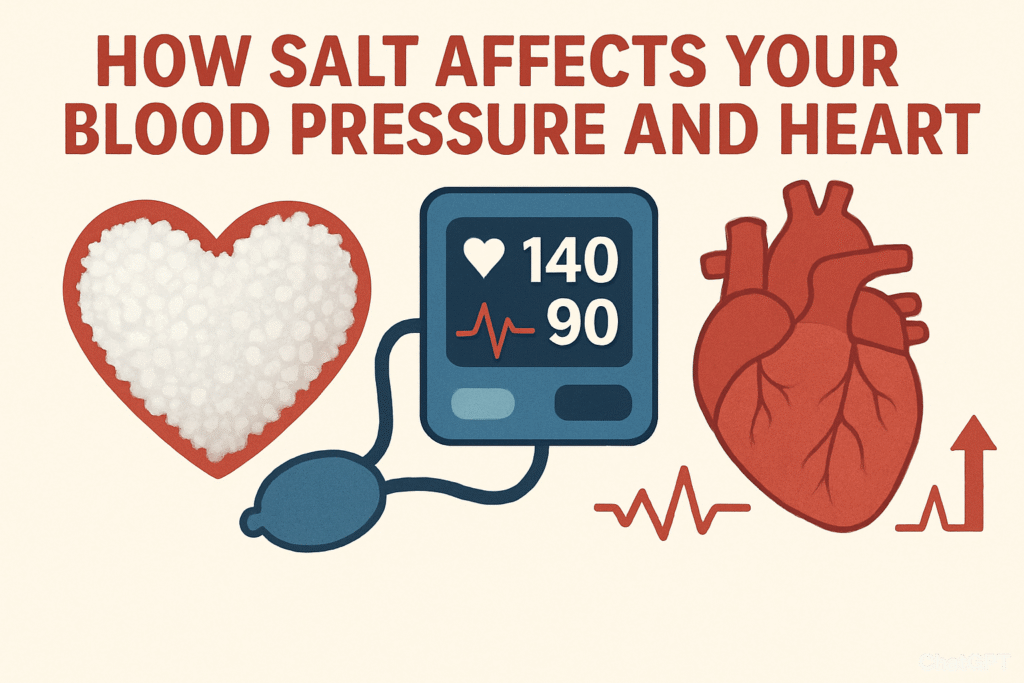Salt — something we use every single day without thinking twice — plays a far bigger role in your heart health than most people realize. While our bodies need a small amount of sodium to function properly, too much salt can cause serious health problems, particularly when it comes to blood pressure and heart health.
According to Dr. Tanmay Kulkarni, a leading Cardiologist in Baner, high salt consumption is one of the most common dietary factors contributing to hypertension (high blood pressure) and an increased risk of heart disease. Understanding how salt affects your body can empower you to make small yet meaningful lifestyle changes that protect your heart in the long run.
Why Your Body Needs Salt
Salt (or sodium chloride) helps maintain fluid balance, supports muscle function, and ensures proper nerve signaling. In moderation, it is essential for good health. However, the key word here is moderation.
The average adult needs about 1,500–2,300 mg of sodium per day, but most people consume more than double that amount due to processed foods, snacks, and restaurant meals. Excess sodium forces your body to retain water to dilute the extra salt in your bloodstream — and this is where the trouble begins.
How Excess Salt Affects Blood Pressure
When your body holds on to more water due to high salt intake, the extra fluid increases the volume of blood circulating through your arteries. This puts additional pressure on the walls of your blood vessels, leading to high blood pressure.
Over time, this constant pressure damages the inner lining of your arteries, making them stiff and narrow. Narrow arteries force your heart to work harder to pump blood throughout your body, and this ongoing strain can lead to heart failure, stroke, or heart attack.
A highly experienced Cardiologist in Pune would often emphasize that even a small reduction in daily sodium intake can make a big difference. Cutting back by just one teaspoon of salt a day can lower blood pressure and significantly reduce your risk of cardiovascular complications.
Long-Term Effects on Heart and Overall Health
Excessive salt doesn’t just raise your blood pressure — it affects several vital systems in your body. Some of the long-term effects include:
- Heart Enlargement – As your heart works harder to pump against elevated pressure, the left ventricle thickens, increasing the risk of heart failure.
- Kidney Damage – High salt levels reduce kidney efficiency, leading to fluid retention and increased blood pressure.
- Arterial Stiffness – Continuous strain from high sodium can cause arteries to lose elasticity, contributing to atherosclerosis (plaque buildup).
- Stroke Risk – Hypertension from salt overload is one of the top causes of stroke worldwide.
As a reputed Heart Specialist in Pune, Dr. Tanmay Kulkarni often educates patients that maintaining heart-healthy habits is far more effective than managing heart disease later. Reducing sodium intake is one of the easiest and most impactful steps toward that goal.
How to Reduce Salt in Your Daily Diet
Making dietary changes doesn’t mean you have to sacrifice flavor. With a few smart choices, you can enjoy delicious meals that are good for your heart:
- Read Food Labels Carefully: Choose products labeled “low sodium” or “no added salt.”
- Cook More at Home: Homemade meals help you control how much salt you use.
- Flavor with Herbs and Spices: Basil, rosemary, cumin, and lemon juice can replace salt while enhancing flavor.
- Avoid Processed Foods: Packaged snacks, instant soups, and ready meals often contain hidden sodium.
- Rinse Canned Foods: If you use canned beans or vegetables, rinsing them can remove up to 40% of the added salt.
Even small, consistent efforts make a lasting impact on your heart’s health. If you’re unsure how much salt you’re consuming or need help managing high blood pressure, consulting an experienced Cardiologist in Baner can guide you toward a personalized, heart-healthy plan.
The Role of Lifestyle in Blood Pressure Control
Besides lowering salt intake, other lifestyle changes can help keep your blood pressure and heart in check:
- Exercise Regularly: Aim for at least 30 minutes of moderate activity daily.
- Stay Hydrated: Drinking enough water supports kidney function and sodium balance.
- Quit Smoking and Limit Alcohol: Both habits worsen hypertension and heart strain.
- Manage Stress: Meditation, yoga, and breathing exercises help reduce cortisol levels
- Get Regular Checkups: Early detection of rising blood pressure can prevent complications.
A qualified Heart Specialist in Pune can help you monitor these lifestyle factors effectively and ensure that your heart stays healthy for years to come.
Final Thoughts
Salt is essential — but in the right amount. The key is balance. Most of us don’t realize how much hidden sodium sneaks into our meals daily. Taking conscious steps to reduce salt can protect your arteries, stabilize your blood pressure, and strengthen your heart.
As Dr. Tanmay Kulkarni, a trusted Cardiologist in Pune, advises his patients: “Your heart doesn’t need drastic changes overnight — it needs consistent, smart choices every day.” By keeping an eye on your salt intake, staying active, and following medical guidance, you can safeguard your heart and live a healthier, longer life.


 Select an element to maximize. Press ESC to cancel.
Select an element to maximize. Press ESC to cancel.